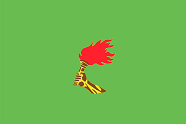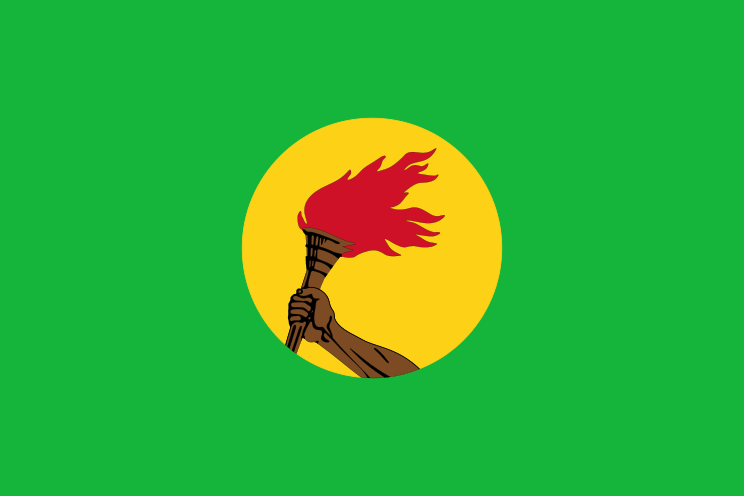Popular Movement of the Revolution

| |
| Established | April 17, 1967 |
| Headquarters | Makanda Kabobi Institute, Kinshasa, Zaire |
| Ideology | "Authentic Congolese nationalism" (1966-1970) Authenticité (1971-1974) Mobutism (1974-1976) |
| Party founder | Mobutu Sese Seko |
| Political director | Nyiwa Mobutu |
| Slogans | "Neither left, nor right, nor even center" "Serve others, not yourself" |
The Popular Movement of the Revolution (French: Mouvement Populaire de la Révolution), better known by its French acronym, "MPR," is the sole legal party of Zaire. Founded on April 17, 1967, the party's creation marked the emergence of "the nation politically organized." Rather than being the emanation of the state, the state was henceforth defined as the emanation of the party. Thus, in October 1967 party and administrative responsibilities were merged into a single framework, thereby automatically extending the role of the party to all administrative organs at the central and provincial levels, as well as to the trade unions, youth movements, and student organizations. In short, the MPR had now become the sole legitimate vehicle for participating in the political life of the country. Or, as one official put it, "the MPR must be considered as a Church and its Founder as its Messiah."
The party's official doctrine (made public in May 1967) was laid out in the Manifesto of N'Sele, so named because it was drafted at the president's residence at N'Sele, sixty kilometers upriver from Kinshasa. The major themes advanced by the manifesto were nationalism, revolution, and authencity.
- Nationalism implied the achievement of economic independence.
- Revolution, described as a "truly national revolution, essentially pragmatic," meant "the repudiation of both capitalism and communism." "Neither right nor left" thus became one of the legitimizing slogans of the regime.
- Authenticity was defined as "authentic Zairian nationalism and condemnation of regionalism and tribalism." (Please see main article.)
"Economic independence," began in small stages, most notably the nationalization of the Belgian firm Union Minière du Haut-Katanga, which became Gécamines. This culminated, on November 30, 1973, in "Zairianization." Mobutu declared, "Zaire is the country that has been the most heavily exploited in the world. That is why farms, ranches, plantations, concessions, commerce, and real estate agencies will be turned over to sons of the country." Whether the intentions behind it were well or ill, the effects of Zairianization were disastrous; nearly all the nationalized industries were handed out to cronies of the regime, and under their new ownership they either went bankrupt or had all their assets sold off. The economy, previously relatively prosperous, quickly became a total wreck. Zaire's economy began a precipitous slide that continues to this day.
Throughout all this, the MPR has remained the country's sole party. Membership is compulsory for all citizens (all Zairians automatically belong to the party, regardless of age), and attempts to found opposition parties are ruthlessly suppressed.
The MPR also has several branches in the military, has complete control of the country's sole labor union, and has a youth wing, known as the Youth of the Popular Movement of the Revolution.
The current political director of the MPR is Mobutu's son, Nyiwa, the President's designated heir.

|
République du Zaïre | 
|
|---|---|---|
| Main article: Zaire | ||
| Categories: Politics | History | Military | Popular Movement of the Revolution | Economy | Characters | Foreign affairs | Geography | National parks | Miscellaneous | ||
